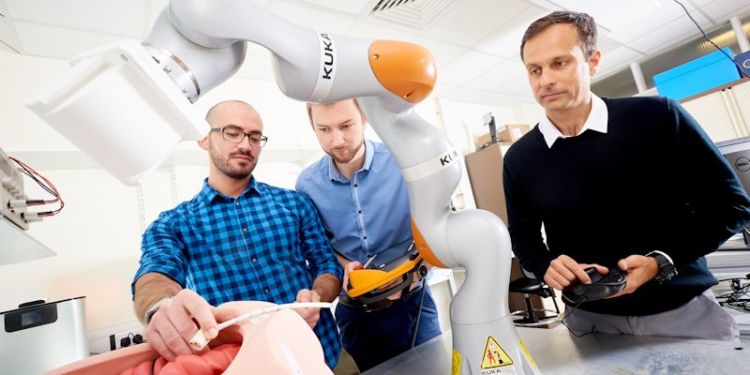Major prize for robotic colonoscopy platform

A robotic device designed to reduce the pain and discomfort of colonoscopy has won a major innovation award.
The device, now in the advanced stage of development, is the culmination of 10 years of research by teams from the Universities of Leeds, Turin and Vanderbilt, in the US. The award, the KUKA Innovation Award 2019, was made by KUKA, the German manufacturer of robotic systems.
Dr Rainer Bischoff, Vice President of KUKA Corporate Research, said the device would bring significant benefits to patients, and could save lives.
A small capsule-shaped device is inserted into the patient’s colon and is capable of relaying pictures and taking tissue samples.
It is manoeuvred through the body by a process of magnetic coupling. There are magnets inside the capsule and on a robotic arm hovering over the patient’s abdomen. The robotic arm gently manipulates the capsule through the colon by using harmless magnetic forces. An AI system monitors the precise location of the device in the body.
The researchers believe the procedure will be less painful than a conventional colonoscopy, which involves a doctor or nurse pushing a semi-rigid endoscope into the body.
Patient trials to evaluate the effectiveness of the device are due to start next year and will be supported by Cancer Research UK.
The aim of the robotic technology is to reduce the cost and pain associated with colonoscopy, one of the main diagnostic tests used in cases of suspected colorectal cancer.
Pietro Valdastri, Professor of Robotics and Autonomous Systems at the University of Leeds who is leading the collaboration, said:
We put a lot of effort into this project. We want to save lives with it. Colorectal cancer is a great danger and our technology can make screening more accessible and painless.

He added:
The team, composed by Joe Norton, Bruno Scaglioni, James Martin and Giovanni Pittiglio did an incredible job in setting up a great demo and illustrating to the audience and the judges the potential of our application.
The prize was announced at the MEDICA 2019 exhibition in German.
The idea of magnetic coupling is being extended to develop other, less invasive ways of getting inside the human body, opening up the possibility that surgeons will eventually be able to perform procedures in hitherto inaccessible areas such as deep in the brain or lungs.
For further information, please contact David Lewis in the University of Leeds press office: 0113 343 2049.




